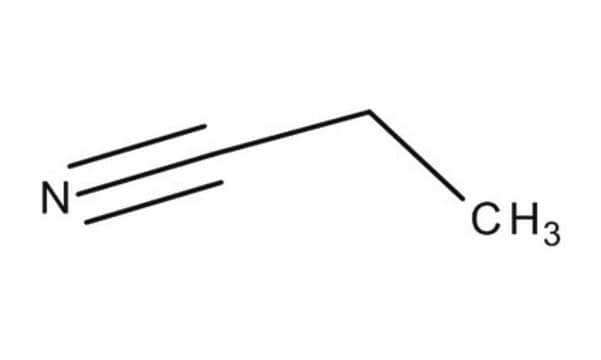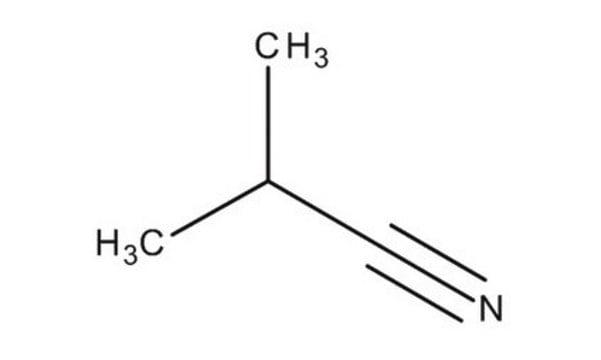538264
Butyronitrile
≥99%
Sinónimos:
Propyl cyanide
About This Item
Productos recomendados
vapor density
2.4 (vs air)
Quality Level
vapor pressure
23 mmHg ( 25 °C)
assay
≥99%
autoignition temp.
910 °F
refractive index
n20/D 1.384 (lit.)
bp
115-117 °C (lit.)
mp
−112 °C (lit.)
solubility
DMF: miscible(lit.)
alcohol: miscible(lit.)
diethyl ether: miscible(lit.)
water: very slightly soluble(lit.)
density
0.794 g/mL at 25 °C (lit.)
SMILES string
CCCC#N
InChI
1S/C4H7N/c1-2-3-4-5/h2-3H2,1H3
InChI key
KVNRLNFWIYMESJ-UHFFFAOYSA-N
¿Está buscando productos similares? Visita Guía de comparación de productos
General description
Application
signalword
Danger
hcodes
Hazard Classifications
Acute Tox. 1 Inhalation - Acute Tox. 3 Dermal - Acute Tox. 3 Oral - Flam. Liq. 2
Storage Class
3 - Flammable liquids
wgk_germany
WGK 1
flash_point_f
71.6 °F
flash_point_c
22 °C
ppe
Eyeshields, Faceshields, Gloves, type ABEK (EN14387) respirator filter
Certificados de análisis (COA)
Busque Certificados de análisis (COA) introduciendo el número de lote del producto. Los números de lote se encuentran en la etiqueta del producto después de las palabras «Lot» o «Batch»
¿Ya tiene este producto?
Encuentre la documentación para los productos que ha comprado recientemente en la Biblioteca de documentos.
Los clientes también vieron
Nuestro equipo de científicos tiene experiencia en todas las áreas de investigación: Ciencias de la vida, Ciencia de los materiales, Síntesis química, Cromatografía, Analítica y muchas otras.
Póngase en contacto con el Servicio técnico














